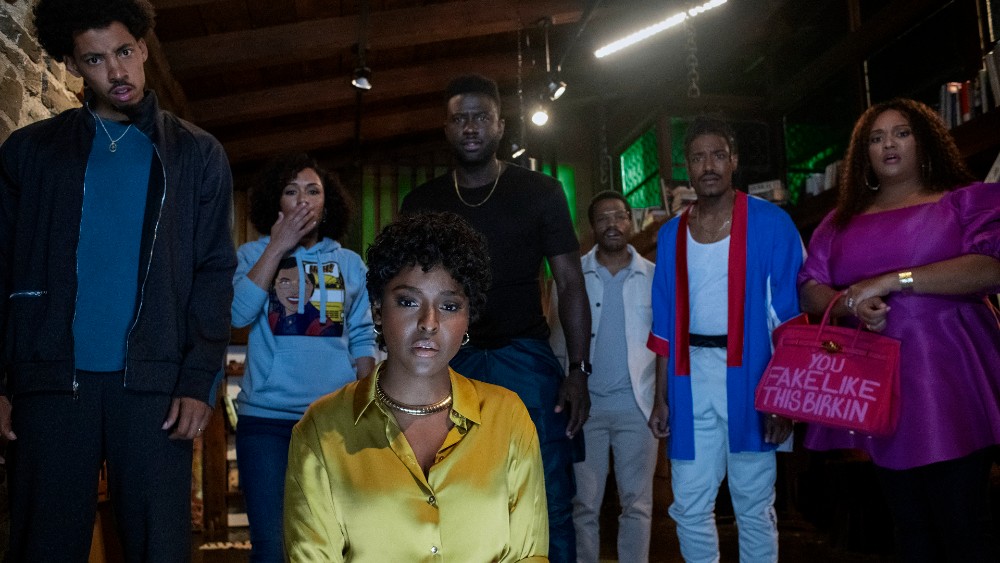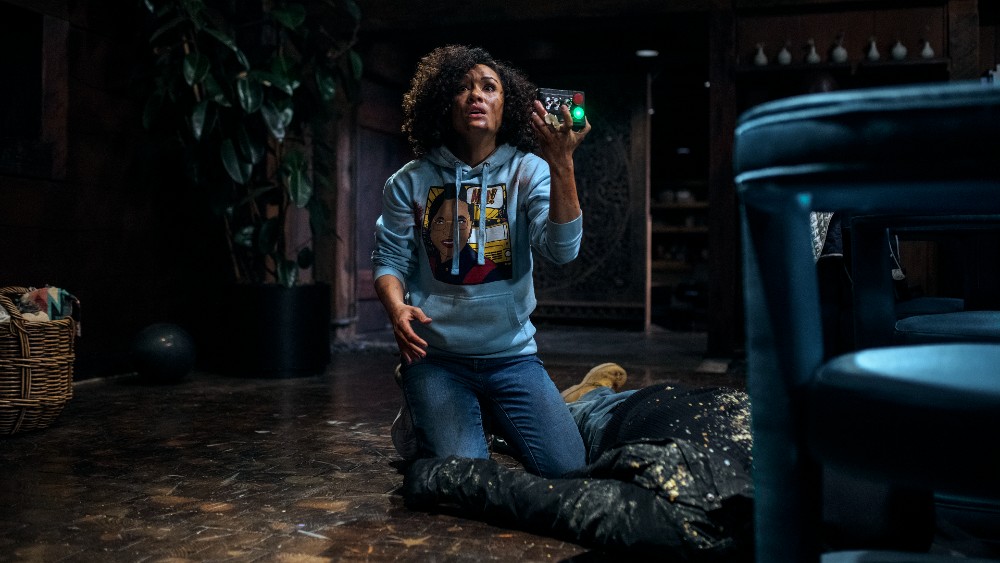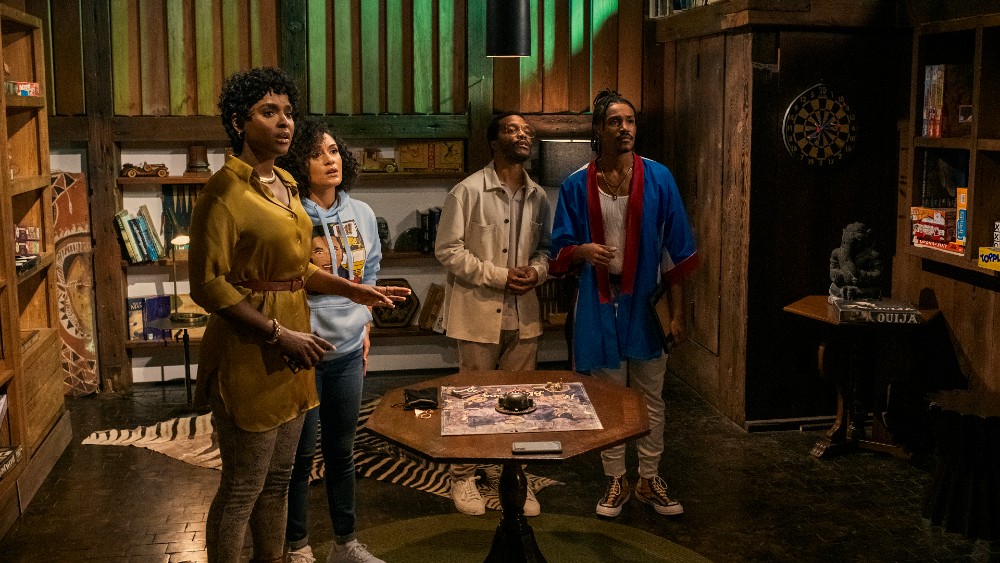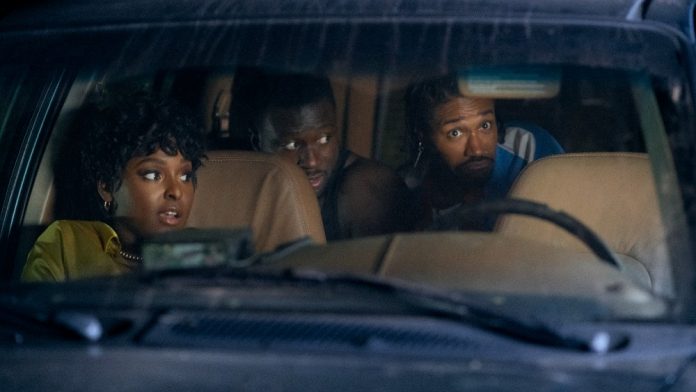Director Tim Story has had a fairly illustrious career working within the studio system, where, in addition to directing 2005’s Fantastic Four and its 2007 sequel, he directed a string of successful comedies, starting with the original Barbershop in 2002 and followed by a string of comedies with Kevin Hart and producer Will Packer, including 2012’s Think Like a Man and its 2014 sequel, and the two Ride Along movies pairing Hart with Ice Cube. Those last four films alone grossed $370 million domestically and pretty much solidified Story as one of Hollywood’s go-to directors — Black or otherwise — for studio comedies.
The Blackening is a different kind of movie for Story, primarily because it was produced independently, but also because it’s his first foray into horror. Based on a short film by Dewayne Perkins, The Blackening is an ensemble horror-comedy about a group of friends who gather at a remote cabin for Juneteenth only to discover that they’re joined by a masked psycho who uses a board game to identify and kill the “blackest” among them.
Featuring a stacked cast of comedic talent including Jermaine Fowler (Coming 2 America), Grace Byers (Empire), Yvonne Orji (Insecure), X Mayo (The Daily Show), Sinqua Walls (White Men Can’t Jump), and SNL alum Jay Pharoah, The Blackening is well-positioned to take advantage of the Juneteenth holiday, and it’s riding high off strong word-of-mouth from the festival circuit, having premiered last fall as part of the Midnight Madness lineup at the Toronto Film Festival. The film will be screening this week at Tribeca Festival, where its high-profile New York premiere will be held at the legendary Apollo Theater on Tuesday, June 13.

Above the Line recently spoke with Story about how The Blackening came about and was put together on a much smaller budget than many of his studio movies.
Above the Line: I’m curious how The Blackening came your way. I know it’s based on a screenplay by Tracy Oliver and Dewayne Perkins, but how did you get involved? What’s the connection?
Tim Story: Actually, it was a short Dewayne did that kind of went viral and just got an amazing amount of views and attention. Tracy contacted Dewayne, and said, ‘Can we lengthen this into a feature film?’ Luckily, he said, ‘Yes,’ and they came to my company, and I came on as a producer. They then spent a year or two getting a draft, and at some point, when they gave me the draft, I read it [and] just thought it was incredible. We hadn’t found a director at the time, and I just thought, “Well, I could find a little window. Why don’t I just do it?” because I just thought it was hilarious, entertaining, very clever, and just a smart film. So I said, ‘Yes,’ and here we are.
ATL: Was the short just the scene of them playing the board game?
Story: It was really just a short scene. It’s basically a scene where they’re being stalked by this killer. It’s about seven of them if I remember correctly, and in order to survive, they had to give up the person that they deemed the blackest. It was a few minutes of them debating who was the blackest out of this group of friends. We have a scene like that in our movie, but that was it. Once they had to expand that into a bigger feature, they had to figure out how to just take the rest of the characters and the situation and expand it.
ATL: Were you able to use some of the same actors from the short? The cast is just killer, no pun intended. I mean, they’re all really hilarious in their own right, so I wonder if any of them carried over from the short.
Story: The greatest thing we’re proud of is Dewayne, who wrote the short, made the short, also wrote the screenplay, and then is also one of the stars of the film. So Dewayne came back to grace our presence with his talents. It’s been awesome, and then the rest are just a group of actors [who] we just found in the audition process [who] we just thought were perfect to play these roles.
ATL: Had Dewayne done a lot of acting before this?
Story: He has been. This is his first feature coming out in theaters, but at some point, you write something for yourself. We’ve been very proud of the fact that he wrote this part, and we were actually able to have him do it. I thought he did [a great job] and as audiences see it, they’ll see how great of a job he did.

ATL: Jermaine Fowler, I knew from Coming 2 America and some other things, but he’s hilarious in this as Clifton, who is a very different character…
Story: He’s a chameleon. I say it to him all the time. Sometimes, you can blink and not know that he’s in the movie that you’ve been watching for an hour or so.
ATL: I knew Sinqua because he just got a bond on the Hollywood Stock Exchange a few days ago, but he also played Don Cornelius on a TV series, apparently. So what made you think of him for this character?
Story: Putting together the cast — as producers, with Tracy and Brian — we just started to think about who out there is a great talent [who] we wanted to work with. At some point, his name came up [and] we were able to do an audition with him. He gave you this performance in the audition that said “[we] had to have them be a part of the film.” We had a character that he seemed to fit quite well, and then it was great for him to then bring his own personal touches to the character. Luckily, we got him.
ATL: You’ve directed a lot of comedy, but I was surprised that you have never delved into horror, or even a horror-comedy like this one. This is your first horror anything. Are you a fan of the genre, and had you wanted to play in that world before this?
Story: No, I was probably as surprised as you. I didn’t exactly look for this kind of thing. Even in me [coming on] as a producer, I never thought, in the beginning, that I would do it — although I learned through this process how much I’m a fan of the genre. It’s been kind of great to open up this little want in my career to do more of this type of stuff in the horror genre. It’s amazing what you find you actually love when you start to dabble in it.
ATL: I assume it was a pretty tight script, so was there any room for improv in the film, and where do you stand on improv? You’ve worked with Kevin Hart so much that you obviously have that experience in that area…
Story: Look, I encourage it. I think, first and foremost, when we do have a script — like, in this case, we had a script that was, I’d like to say, pretty perfect. You always want to respect that, because it does bring a certain amount of comfort when you don’t have to come up with too much.
What was great about this [was that] the cast really respected it. Although I give [them] a lot of freedom to find what they need to add — those little touches of personal magic — we found that you’ll be surprised at how much was actually on the page that we filmed. And then, of course, they found those little things. There are lots of moments in the film that just came out of being on set and them being in the moment, and me cutting it in, and it works. I’m a fan of it, but I’m a [bigger] fan of it when it works.
ATL: There’s one particular visual gag that kills — when Jermaine’s character comes up and turns Sinqua’s gun the right way, away from a 90-degree angle. It just seems like one of those great in-the-moment gags…
Story: That was one of my favorite moments. That was Jermaine, just as we were getting into that sequence, he didn’t even tell us he was going to do it. Or, [he] might have told Sinqua, I’m not exactly sure. I didn’t know it was coming, and he just did that. It just made us laugh on set, and look, you’re on set, the crew and the cast on set is your first audience, and when people laugh that much, you know you’re onto something, so we just made sure it became a part of the film.

ATL: Where did you shoot this? Did you actually build the interiors on stage or did you actually find someplace where you could shoot it?
Story: Oh, no, we had no money. We didn’t build any sets. We found a house in the middle of Brentwood. It actually was probably 100 years old, and luckily, we were able to secure it. We shot right here in Los Angeles. No, we didn’t have a budget to build anything. We had to make everything work, but as you can see, I think it worked out for us pretty well.
ATL: You’ve made many studio movies over the years. Is this the most independent film you’ve done? I forget whether Barbershop was done independently or whether MGM was always involved…
Story: No, you hit it right on point. This is kinda the first indie — if you want to call [it that] — that I’ve really done in my professional career. It is the smallest budget I’ve done. You have to pull some favors. We shot in less than half the time that I’m normally used to in shooting movies, but we found a way to pull it off. I think the discipline of the cast and crew was really important to pull this off, and luckily, we did it.
ATL: It just goes to show that if you have a solid script and a great cast that’s game for anything, you’re well-positioned for success. You obviously shot this during COVID with all the protocols, so how was all that in terms of being an independent movie on a limited budget? Were you still able to test every day?
Story: It was those types of rules. We had to test — what was it? – three times a week, I believe, and they had the silos in terms of actors and director and DP and this and that. And then, of course, certain parts of the crew were separated. But look, we gave it a shot. It was tough, but at the same time, once you get into your own little bubble, we were able to do enough rehearsals and respect each other enough, as far as [our personal] space. Anytime there was a little bit of a scare, we were able to kind of figure it out, and I’m happy to say that we had no real issues when we did it.
ATL: I have to ask about one of the credits I saw in the movie… “Music by Dexter Story.”
Story: Yeah, that is my older brother.
ATL: I see he’s been doing music for movies and TV for a long time, but this is the first time you’ve actually used him, right?
Story: Yes!
ATL: Because it’s an independent film, and he could do the music as a favor?
Story: Yeah, basically that. He did me a favor and came on and did this, and it was really exciting to use my brother in it. He really got into it. I don’t believe he’s done any horror films before this, and it was fun to have the family on board.
ATL: Do you think you’ll use him on something else down the road, too?
Story: Absolutely. He did a fantastic job for me.

ATL: The movie premiered at TIFF last September. What do you remember from that night?
Story: I don’t remember the theater we were in, but we were in front of a few hundred people. It played like gangbusters. It just was a great time. The audience got it. The laughs hit. They were loud. It was a midnight showing, and it was one of the greater screenings that we’ve had.
ATL: At Tribeca, I think it’s playing at the Apollo. That’s gonna be amazing…
Story: That one I cannot wait for. I hate to say [it, but] I’ve never been to the Apollo, so to be going there for the first time with my movie is kind of a cool experience I’m looking forward to.
ATL: Hopefully, they bring in some of the energetic audiences that are there for Showtime at the Apollo…
Story: Absolutely.
ATL: You know they’ll be honest. If they don’t like something, they’ll let you know. Have you been working on anything else or had anything in production since this wrapped, which must have been last year since it premiered at TIFF?
Story: It’s been done for a while. I’m finishing up a project over at Disney, and then we’ll see what else happens. I’m excited about a few things I’m developing, and fingers crossed, we get some stuff out there to [the] public soon.
ATL: Do you feel things are starting to get back to normal, other than the Writers Strike delaying things (for good reason, obviously)? Are things back to normal as far as the COVID aspect of it all?
Story: It looks promising. This year, we’ve got many more releases in theaters than we did last year, and the number continues to grow. I’m just hoping. I really missed the communal experiences of being in the theaters. It’s one of the reasons why we made this movie. We were hoping to make something that makes people want to go out and be with [a] crowd, be with an audience, laugh, [and] kind of get scared together, [so] my fingers are crossed. I do believe this year shows that the efforts are definitely there to get things back as close to normal as possible.
ATL: Has there been any discussion about a potential sequel if this film does well?
Story: We’ve definitely discussed it, [but] we need the audiences to go out and see the movie. We have our own little ideas for a sequel, and we hope we can do it. It is one of those things we look forward to. In making this, the idea was always to do more of them, and hopefully, the audience will go out and vote and allow us to.
[Note: We saved one last question with Story talking about a scene from the end credits, not necessarily a spoiler but a funny gag worth staying for.]
ATL: I have to ask about that end credits scene, where they’re sprayed with the hose. Did that really happen?
Story: No, that didn’t happen. All of that is visual effects, but I’m happy that you said that. It’s real enough to maybe fool some people. From what I understand, those things hurt, so I would have never done that to a cast. They did understand what it is we were trying to accomplish [so they] did the tumbles and did the falls, and then we just kind of married it. I’m really excited that it looked real.
Lionsgate will release The Blackening in theaters on Friday, June 16, though the film will screen three times this week at the Tribeca Film Festival as well.



